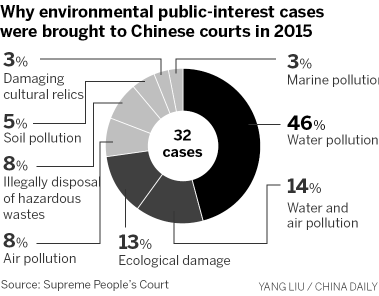Eco-cases up, but 'far from enough'
Updated: 2016-07-28 08:59
By Cao Yin(China Daily)
|
|||||||||

China's top court called on environmental organizations and prosecuting authorities to redouble their efforts in dealing with environmental public-interest litigation, as the number of such cases has increased rapidly.
Since relaxed rules for initiating a lawsuit took effect in January 2015, Chinese courts have accepted 93 environmental civil public-interest lawsuits brought by NGOs.
"Environmental organizations have a role to play in protecting the environment and ecology," said Lyu Zhongmei, of the top court's environmental and ecological research center.
"The number of cases initiated by NGOs looks big, but in fact it is far from enough," she said. "More than 700 environmental organizations across the nation have been certified by the Ministry of Civil Affairs to sue in public-interest cases, but so far less than 10 of them have brought such lawsuits."
Public-interest litigation brought by prosecutors against environmental bureaus that neglected their supervisory duties are also seldom seen, according to the research center. The small sample makes it hard for the top court to push further in that area, it said.
Courts accepted 116 environmental public-interest cases from January 2015 to June. Of those, 104 were civil litigations, and 12 involved government departments, according to a white paper released by the Supreme People's Court.
There were only 65 disputes between 2007 and 2014, the court said, adding that the boom in the past year is attributable to an easing of the legal procedures required to initiate a case.
In January 2015, a new Environmental Protection Law took effect, making clear that NGOs are allowed to initiate public-interest lawsuits.
Thirteen months later, the top court issued a judicial guideline allowing prosecuting bodies to initiate such litigation and selecting courts in 13 provinces, municipalities and autonomous regions for a pilot grogram.
Lyu suggested that courts should increase their communication with financial departments, as some regional governments have established special funds for environmental protection.
"What we should do is to ensure that govaernments can take advantage of the funds in line with the law and put them to use," she said.
For improving hearings in public-interest cases, the courts have set up 558 tribunals or panels to make environmental trials more professional, the white paper said.
From January 2014 to June, almost 300,000 environmental and ecological cases were concluded in courts. Of those, 37,216 involved criminal matters, and 47,087 offenders were punished.
Related Stories
Environment Regulation System Reform during the 13th Five-Year Plan Period: Objective, Measures and Policy Options(No.32, 2016) 2016-07-25 17:20
China’s Environment Supervision System Has Entered a Crucial Stage for Adjustment: The Situation Facing Environmental Supervision System Reform during the 13th Five-Year Plan Period and Relevant Significance(No.31, 2016) 2016-07-25 17:19
Li vows transparent, fair environment for European investors 2016-07-14 07:16
The cost of protecting the environment, Juno space probe 保护环境付出的代价,“朱诺”木星探测器 2016-07-07 16:08
Xi promises foreign NGOs an improved working environment 2016-07-07 07:51
Today's Top News
No explosion, no injury report in Germany: Police
Geneva airport tightens security after French tipoff
Bill Clinton portrays Hillary as 'change-maker'
Priest, 84, killed in France, attack claimed by IS
Knife attacker in Japan kills 19 at disabled center
Michelle Obama rocks Democratic convention
Syrian suicide bomber in Germany faces deportation
Shooting at Florida nightclub kills, wounds 16
Hot Topics
Lunar probe , China growth forecasts, Emission rules get tougher, China seen through 'colored lens', International board,
Editor's Picks

|

|

|

|

|

|







